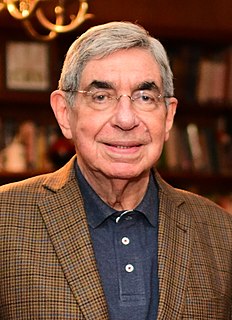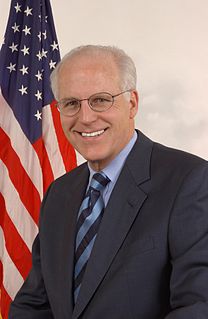A Quote by Bruce Sterling
War as Napoleon knew it just not possible any more. However, we're very unlikely to accept or recognize 'world peace' even when we get it.
Related Quotes
With all of the history of war, and the human race's history unfortunately has been a good deal more war than peace, with nuclear weapons distributed all through the world, and available, and the strong reluctance of any people to accept defeat, I see the possibility in the 1970's of the President of the United States having to face a world in which 15 or 20 or 25 nations may have these weapons.
I have to believe in the possibility of peace, because the alternative is to accept the inevitability of continual war, and of always living in fear. It doesn't have to be that way. However, there are no simple solutions, and I am not the possessor of a magic formula for peace. All I can say is that for peace to succeed it requires perseverance, patience, humility, compromise, and commitment, from all parties.
Don't look for any other state than the one you are in now; otherwise, you will set up inner conflict and unconscious resistance. Forgive yourself for not being at peace. The moment you completely accept your non-peace, your non-peace becomes transmuted into peace. Anything you accept fully will get you there, will take you into peace. This is the miracle of surrender.
Peace is here now. It's just that we don't recognize it. Let's say that 98 percent of people in the world are wanting peace. Now people say, even people from Siberia? Yes. We want world peace. The two percent is really tying to mess it up. It's so sad in a way, because by messing it up what are they going to get? Their children are going to suffer, their grandchildren are going to suffer, and they might even die before something gets good.
The twentieth century had dispensed with the formal declaration of war and introduced the fifth column, sabotage, cold war, and war by proxy, but that was only the begining. Summit meetings for disarmament pursued mutual understanding and a balance of power but were also held to learn the strengths and weaknesses of the enemy. The world of the war-or-peace alternative became a world in which war was peace and peace war.
Militarists say that to gain peace we must prepare for war. I think we get what we prepare for. If we want a world where peace is valued, we must teach ourselves to believe that peace is not a ‘utopian vision’ but a real responsibility that must be worked for each and every day in small and large ways. Any one of us can contribute to building a world where peace and justice prevail.
To suggest that war can prevent war is a base play on words and a despicable form of warmongering. The objective of any who sincerely believe in peace clearly must be to exhaust every honorable recourse in the effort to save the peace. The world has had ample evidence that war begets only conditions that beget further war.
I am not a historian, but I find myself being more and more fascinated by history and now I find myself reading more and more about history. I am very interested in Napoleon, at the present: I'm very interested in battles, in wars, in Gallipoli, the First World War and so on, and I think that as I age I am becoming more and more historical. I certainly wasn't at all in my early twenties.
The war industry people are very together; they know exactly what they want; they don't even have to talk to each other. The peace industry people are just intellectuals who are very critical of each other... Unless the peace industry is powerful, we're always going to have war. It is as simple as that.
The question of whether world peace will ever be possible can only be answered by someone familiar with world history. To be familiar with world history means, however, to know human beings as they have been and always will be. There is a vast difference, which most people will never comprehend, between viewing future history as it will be and viewing it as one might like it to be. Peace is a desire, war is a fact; and history has never paid heed to human desires and ideals.
The United States, as the world knows, will never start a war. We do not want a war. We do not now expect a war. This generation of Americans has already had enough - more than enough - of war and hate and oppression. We shall be prepared if others wish it. We shall be alert to try to stop it. But we shall also do our part to build a world of peace where the weak are safe and the strong are just. We are not helpless before that task or hopeless of its success. Confident and unafraid, we labor on - not toward a strategy of annihilation but toward a strategy of peace.
What we learn from the past is that you cannot make peace against people by interfering and - and just launching a war and trying to change a regime without any political solution. So my role is first to avoid any war and try to - to frame the discussion in order to create peace and have a comprehensive peace process and preserve unintelligible and especially in this Middle East region. That's what I tried to do in Lebanon, for instance, by negotiating both with M.B.S., with the Lebanese government.
Japan suffered terribly from the atomic bomb but never adopted a pose of moral superiority, implying: 'We would never have done it!' The Japanese know perfectly well they would have used it had they had it. They accept the idea that war is war; they give no quarter and accept none. Total war, they recognize, knows no Queensberry Rules. If you develop a devastating new weapon during a total war, you use it; you do not put it into the War Museum.



































